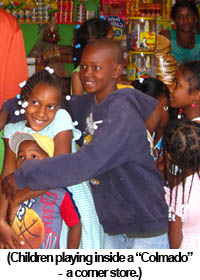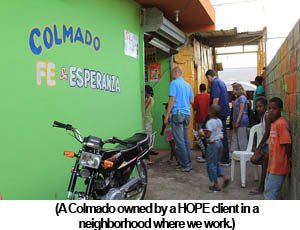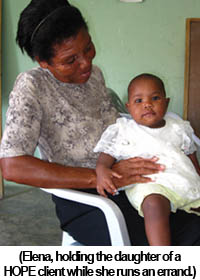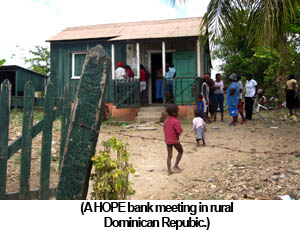![]()
Aaron Roth – HOPE International – March 2011
- Download this as a pdf: Aaron Roth – March 2011 Update.pdf
- Blog and Support Page: www.AaronRoth.net/support/
- HOPE International Worldwide – www.HOPEinternational.org
- February ’11 Newsletter: February 2011 Update.pdf
 Nearing the completion of two months in the Dominican Republic, I’m feeling like this place is becoming a second home, and while I’m getting used to what life is like here, there are some things about working with the poor that I don’t feel like I’ll get used to. Sure, I’ve been to over 50 of HOPE’s microfinance meetings in the communities, and I’m helping to rewrite and update the training and operations manual. I could walk you through the loan process, how to structure a bank meeting, and how to deliver the Biblical devotionals and business training materials we use. I’m getting used to all that. However, I don’t think I’ll get used to experiencing the look of fear and insecurity I see in the eyes of a new client when I ask them about how much money they have in their savings.
Nearing the completion of two months in the Dominican Republic, I’m feeling like this place is becoming a second home, and while I’m getting used to what life is like here, there are some things about working with the poor that I don’t feel like I’ll get used to. Sure, I’ve been to over 50 of HOPE’s microfinance meetings in the communities, and I’m helping to rewrite and update the training and operations manual. I could walk you through the loan process, how to structure a bank meeting, and how to deliver the Biblical devotionals and business training materials we use. I’m getting used to all that. However, I don’t think I’ll get used to experiencing the look of fear and insecurity I see in the eyes of a new client when I ask them about how much money they have in their savings.
Part of the HOPE process is sitting down with each new client and interviewing them about their family and work situation, and we use a specific form to measure their level of poverty. HOPE deliberately tries to reach the poorest of the poor, so when we know that people have a stable job, we make sure they are receiving the services of standard Dominican banks, and focus on people who don’t have a job or access to any banking services whatsoever. Recently, I was working with a loan officer doing these interviews and when we asked the Haitian woman: “Denise, how much money do you have in your savings?” she froze up and got scared to tell us her answer.
I think she was afraid to tell us that if she only had about $5 in cash that she hid in her home it meant that we wouldn’t let her get a loan. For us, it is a process of understanding the client’s financial situation to make sure we are assisting the poor, for her, she’s worried that she doesn’t have enough money to join HOPE. In this particular case, Denise is 35 years old, has 3 children, no husband, and her family lives in a one room rented house with no electricity, no water, and she has no cell phone. (Pre-paid phones are very cheap in the DR – $3-$8, so to not have a phone means that someone is very poor).
On our survey, our measurement of poverty ranges from 0 – 20. A score of 12 – 20 is average poor, 7 – 12 is very poor, and 0 – 7 is extremely poor. After collecting the data, Denise scored a 2.5. It has been the lowest score that I’ve seen, and when I think about it what it means to her, when she considers the future of her children, I feel the gravity of her worries and concerns . . . I don’t think I will get used to these feelings.
Bringing HOPE to These Communities
 To become a client of HOPE, we require that you attend five business training sessions where a loan officer teaches you about the mission and vision of HOPE, basic business strategies, the structure and the commitment of the loan, and most importantly, and I’ll quote the loan officer, “Even though you may think that God is distant from you, I want to tell you that He has not forgotten about you or your family, He is here in this community.”
To become a client of HOPE, we require that you attend five business training sessions where a loan officer teaches you about the mission and vision of HOPE, basic business strategies, the structure and the commitment of the loan, and most importantly, and I’ll quote the loan officer, “Even though you may think that God is distant from you, I want to tell you that He has not forgotten about you or your family, He is here in this community.”
For these women, this is the first time they will join a bank, and for a lot of them this is the first time they hear the good news of Jesus: that he is real, that he cares, that he hasn’t forgotten, and that he came to save all that seems hopeless. I’ve seen women argue with a HOPE loan officer, saying that “The Bible isn’t relevant, isn’t true, and that all they’ve ever heard from preachers is judgment and hate.” In turn, the loan officer has responded, “That may have been what someone told you, but that’s not true, that’s not what the Lord says, let me read to you what He says in His Word . . .”
HOPE is interested in the whole person and believes that “faith and action” are the ways to carry out the message of Jesus, to preach good news of salvation, and to provide tangible ways to help the poor. So in the example of Denise, we know that she has been making a living selling food on the street. With her small business, she makes only enough money to feed her children and buy enough food to sell the next day. When she joins HOPE, she’ll get a loan that will allow her to buy food in bulk (which lowers her overall cost), help her buy cooking equipment (to help her prepare more food), and offer her clients a bigger, better variety (helping her make 3-4x as much in a given work day). Elevating someone’s economic situation ensures that there will be enough food for the family, enough for money for medicine, and enough money for the future of the children.
Denise and a group of women in her community had finished four of the five training meetings and were ready to join HOPE. Together, the group will have their own name, and will be referred to as “A bank of HOPE”. At the final training meeting for Denise’s bank of HOPE we asked the question, “Where did you hear about HOPE?”
“God Showed Me Something Good and I Wanted to Tell My Neighbors About It”
Each one of the 15 women in the community bank meeting of HOPE pointed to a woman standing at the door. She smiled and bowed her head away in humility. I realized, that I had seen this woman many times in the community so I asked the loan officer, Ramona, “Who’s that woman? Is this her community? Doesn’t she have a community bank on the other side of town?”
She replied, “Why don’t you ask her?” So, I went up to this woman and politely asked her why I had seen her almost everyday at most of the bank meetings I’d attended.
 Elena chuckled and said, “I only have one community bank meeting, the rest are the meetings of my friends.”
Elena chuckled and said, “I only have one community bank meeting, the rest are the meetings of my friends.”
“You invited your friends to join Esperanza?” I asked.
“Yes, I’ve invited a lot of my friends, my neighbors.” she responded.
“How many community banks of HOPE have you helped to set up? Like 2 or 3?”
“Hmm, probably like 7 or 8, I’m not sure exactly.” (she was humble in her response)
[I did the math in my head, that’s over 100 women that she personally invited that joined HOPE.]
“So how did you invite over 100 women to join HOPE, you have a business, don’t you?” I wanted to clarify.
“I have a business, but while I work I tell people about HOPE. My pastor says that each one of us can tell people about Jesus. And I feel like I can tell people about Jesus while I’m working. HOPE has been good for me, for my business, and for my family. I feel like God showed me something good, and I wanted to tell my neighbors about it.”
I learned later that the place we had the meeting was about 30 minutes from the market where Elena sells food and natural juices. She walked here to make sure that these women attended the meeting. The next day, I attended another training meeting for a new community bank of HOPE. I saw Elena again and I asked her, “So you are starting this one too?” smiling because I knew the answer. She responded, “Oh, this one is much closer to my house.” (Her house? That means that she’s about an hour’s walk from the market where she has her business. I know she walks everywhere, I’ve seen her in transit.)
We were waiting for more of the members to arrive, and the meeting was already starting late. Ramona knew she had another meeting she had to attend and was talking to Elena about the tardiness of the other members. Elena gently touched her arm and said, “I will go get them” and started running up the road.
 The women who were sitting there with us chuckled as Elena ran toward the other houses. I asked them why they were chuckling, one said, “That’s Elena. She’s always running for something.”
The women who were sitting there with us chuckled as Elena ran toward the other houses. I asked them why they were chuckling, one said, “That’s Elena. She’s always running for something.”
—
So while I’m getting used to living here, I don’t want to get used to the great economic and spiritual needs of women like Denise, nor to the hope that Elena carries with her as she runs to the homes of her neighbors to tell them the Good News.
I’m seeing that hope is renewed in each morning that comes. It is the answer that eases the worries of a mother like Denise, it is the strength for Ramona as she visits almost 400 HOPE clients every two weeks, and it is the motivation that encourages Elena to walk in her daily journey through the community. Hope is renewed each day here. I pray that it is for you as well.
Blessings to you and your families, in His name,
-Aaron Roth
aroth@hopeinternational.org
www.AaronRoth.net
Skype: aprothwm05
————————————————————————————————
While I’m volunteering down here in the Dominican Republic, I am still finishing the final part of my fundraising through the remainder of the year. Do pray for the work of HOPE and if you feel led to support me financially, you can find that information here.
Online Contributions:
- Go to www.HopeInternational.org and select the “Donate Now” green tab on the right-hand side of the screen (or click this link: “HOPE International – Donate Now”)
- Under “Allocate your Gift,” find the “Contribution Preference Amount” drop down box
- Select “Other (please specify below)”
- *In the box beside “Other Gift Designation”, write “Fellow: Aaron Roth”
Contributions by Mail (send a check):
HOPE International
Joan Bauman, Donor Care Administrator
227 Granite Run Dr. – Suite 250
Lancaster, PA 17601
Please make all checks payable to:
HOPE International and put “Fellow – Donation: Aaron Roth” in the memo line.
According to IRS regulations, all contributions are treated as donations and are tax deductible to the full extent of the law.
